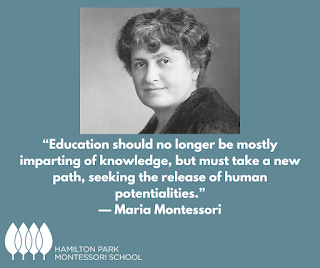Women's History Month
Many of our classrooms are celebrating Women's History Month by sharing some highlights of our very own Dr. Maria Montessori's life and work.
Maria grew up in Italy at a time when girls didn't receive an equal education to boys. She faced prejudice from her male colleagues but she was determined. She not only became Italy's first female pediatrician, but she also later became an early childhood expert - founding schools that put into action her revolutionary educational theories and materials created by her scientific mind, ultimately changing the lives of many children for more than a century to come.
It is amazing to think that Dr. Montessori was able to develop her materials without the benefit of today’s "brain research" technology.
Although she could not view a child’s brain to see which areas lit up when they were using the materials she created, through careful observation she knew what was effective. For example, a child’s fine motor skills, shape and size discrimination, and hand/eye coordination were being strengthened through materials like the "Knobbed Cylinders".
Today, modern neuroscience corroborates the benefits of the Montessori methodology. Maria Montessori spoke of the child's “absorbent mind” being like a sponge which literally soaks up what they see and do.
Fast forward 100 years later and new discoveries in the area of neurology support her hypotheses, showing that the hands do indeed "feed the mind".
What we also love about the methodology that she developed is that it is not only effective for learning new concepts, it helps nurture a love for learning.
Discover the incredible life of Maria Montessori, the pioneering teacher and researcher.



